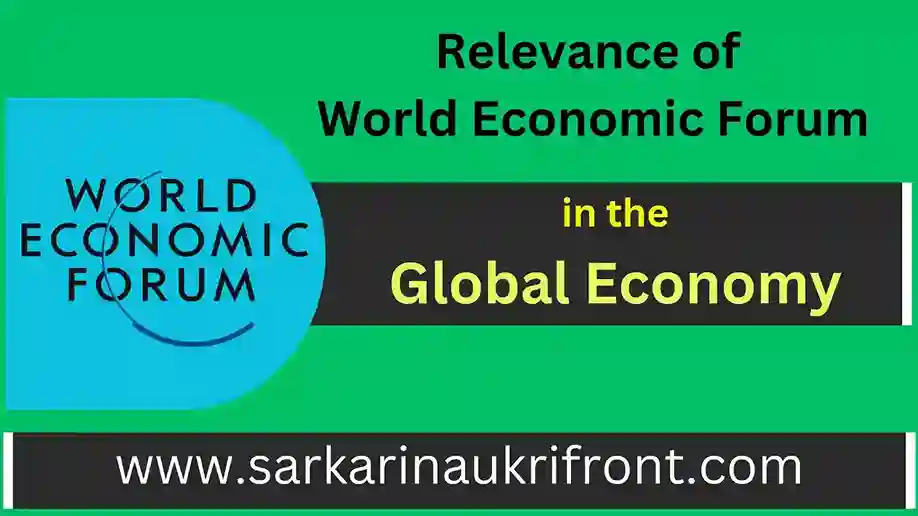World Economic Forum and their Relevance to the Global Economy
Introduction
The World Economic Forum (WEF) is a Swiss-based non-governmental organization founded in 1971 by Klaus Schwab. The World Economic Forum (WEF), well-known for its annual summit in Davos, Switzerland, brings together politicians, economists, corporate executives, and celebrities to talk about significant global problems. With its focus on significant issues like economic inequality, climate change, and technological breakthroughs, the WEF has been instrumental in defining the global economic agenda over the years. The article examines the World Economic Forum’s applicability to the modern global economy, examining its impact, critics, and changing function.

Historical Context and Evolution
-
Founding and Early Years
The European Management Forum, which gave rise to the WEF, initially concentrated on business management techniques throughout Europe. It expanded to include global economic concerns when it was renamed the World Economic Forum in 1987. The early years of the forum were characterized by a focus on increasing company efficiency and management. However, the WEF expanded its scope to cover more economic, social, and political topics as the world economy grew more interconnected.
-
Expansion and Influence
The WEF gained international recognition in the 1990s and 2000s, drawing powerful leaders from all around the world. Its yearly Davos conference, which hosted important discussions on economic policy, global health, and environmental sustainability, came to represent international cooperation. The WEF also started a number of programs and initiatives, like the Global Competitiveness Report and the Global Health Initiative, to address certain global issues.
Role and Impact in the Global Economy
-
Facilitating Dialogue and Cooperation
The World Economic Forum has made significant achievements, one of which is serving as a platform for cooperation and communication among many parties. The WEF brings together leaders from different industries to create a forum for idea-sharing and cooperative issue-solving on a global scale. This special event promotes partnerships that have the potential to result in major social and economic gains by bridging the gap between both the private and public sectors.
-
Shaping Economic Policies
The WEF’s reports and discussions frequently influence global economic policy. For example, the yearly Global Competitiveness Report evaluates nations’ competitiveness using a range of metrics, offering policymakers insightful information. The WEF offers a forward-looking viewpoint that assists governments and businesses in anticipating and adjusting to changes in the global economy. It also discusses upcoming economic trends and issues.
-
Addressing Global Challenges
To resolve some of the most important global issues, the WEF has proven crucial. The forum promotes responsible environmental behavior and sustainable development, for instance, through its climate change projects. Through encouraging cooperation between corporations, governments, and civil society, the WEF’s Climate Initiative seeks to facilitate the shift to a low-carbon economy. Furthermore, by tackling pandemics like the COVID-19 outbreak and enhancing healthcare access, the WEF’s health initiatives, like the Global Health Initiative, have contributed.
Criticisms and Controversies
-
Perception of Elitism
The World Economic Forum has been criticized and involved in controversy despite its contributions. The idea that it is exclusive is one of the most frequent criticisms. The Davos conference, which is sometimes referred to as an assembly of the world’s elite, has come under fire for appearing disconnected from the problems that everyday people face. Opponents contend that the forum’s exclusivity compromises both its effectiveness and legitimacy in tackling global inequity.
-
Limited Tangible Outcomes
The absence of concrete results from the WEF’s deliberations is another point of concern. Although the forum offers a useful arena for discussion, others contend that it rarely results in actual policy or acts. Critics cast doubt on the forum’s ability to address persistent global concerns like poverty and climate change.
-
Corporate Influence
Another issue has been the WEF’s tight relationships with big businesses. The agenda of the meeting, according to critics, is unduly affected by corporate interests, potentially ignoring significant topics that conflict with corporate agendas. This critique is especially significant when talking about social injustice and climate change since business goals can run counter to the concerns of the larger community.
The WEF’s Evolving Role
-
Embracing Inclusivity
The World Economic Forum has worked to increase its transparency and inclusivity in response to concerns. The forum has increased its interaction with academic institutions, young leaders, and non-governmental organizations (NGOs) in civil society. The WEF’s dedication to diversity and inclusivity is demonstrated by programs like the Global Shapers Community, which gives young leaders a voice in setting global agendas.
-
Focus on Sustainability and Equity
In response to the need for a more equitable and balanced global economy, the World Economic Forum has been concentrating more on sustainability and fairness. Launched in reaction to the COVID-19 epidemic, the forum’s Great Reset project seeks to rebuild economies with a focus on social inclusion, environmental sustainability, and economic resilience. The WEF’s acknowledgment of the interdependence of social, economic, and environmental challenges is emphasized by this project.
-
Digital Transformation and Innovation
The World Economic Forum has taken the lead in discussions on innovation and technology as the world economy moves toward a digital economy. The forum discusses how technological innovations like blockchain and artificial intelligence will affect society and the global economy. The WEF assists stakeholders in navigating the opportunities and challenges brought forth by the Fourth Industrial Revolution by promoting discussion on these subjects.
Conclusion
The World Economic Forum is still a significant and powerful force in the world economy. The WEF plays a vital role in creating a more integrated and interconnected world by encouraging dialogue, influencing economic policy, and tackling global issues. For the forum to remain legitimate and effective, it will need to keep developing, responding to criticism, and adopting a more welcoming and equitable stance. The WEF’s role in promoting international cooperation and creative solutions will be critical in forming a sustainable and prosperous future as the globe faces complex and interlinked challenges.
